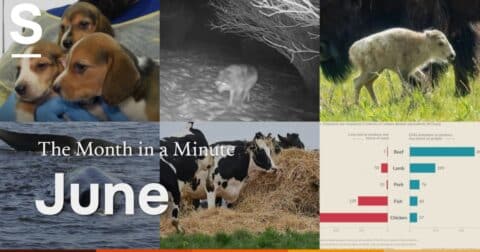Analysis
The Month in a Minute: December 2024
Month in a Minute•2 min read
Analysis
June's top stories about climate, animals and health.


Words by Ross Kinghorn
After a federal investigation of their facility uncovered hundreds of beagles in distress, a beagle breeder that supplied researchers with dogs was ordered to pay $35 million in fines this month. Meanwhile, in Colorado ranchers can now get permits to kill wolves using night vision. Plus, a Republican lawmaker introduced the REAL Meat Act of 2024 which seeks to stop federal funding to cultured meats. And Iceland issued licenses for hunting 128 fin whales.
Plus:
Researchers used an artificial intelligence algorithm to analyze calls by two herds of African savanna elephants in Kenya and found that they call each other by name.
A new study on the trade-offs between animal welfare and the environmental impact of meat finds that choosing lower-carbon meat products means killing more animals.
Just before Pride month, the National Park Service sent out an email that led to national outcry, raising the question of whether employees can participate in parades and other events in uniform.
Here are more headlines that caught our attention this month:
An annual pavilion in Buffalo that tries to change Black residents’ relationship to food has become a healing space for people to reconnect with the Earth.
Family farm advocates are calling for cuts in federal subsidies to large animal feeding operations.
Regulators have found that some farmers are still using medically important antibiotics to promote growth in pigs, despite a 2017 policy to end the practice.
Rising temperatures intensify drought and increase costs for the heavily subsidized crop insurance program. Texas farmers say they couldn’t do business without it.
A rare white buffalo calf has been born in Yellowstone National Park. Indigenous prophecies correlate white calves with times of great change.
A new law would allow the livestock industry to fast-track federal review of feed additives.
Freedom of movement is essential to the survival of species, but cars have disturbed the natural movements of animals. Wildlife crossings could be a solution.
At the G7 summit and Bonn climate conference, world leaders failed to discuss “the cow in the room.”
The world’s fourth mass coral bleaching is underway, but well-connected reefs may have a better chance to recover.
The World Health Organization confirmed the first ever fatal human case of the bird flu subtype H5N2 in Mexico this month.
The USDA is encouraging farmers to enroll in a voluntary program for weekly tests of milk samples taken from bulk coolers on dairy farms, as they warn more cases of avian flu are likely.
As avian flu continues to spread among dairy cattle, some states are implementing testing requirements for animals involved in agricultural fairs.
Floods spreading manure-contaminated water from CAFOs could have a severe impact on public health, experts warn.
Public schools feed a lot of kids. The problem? Nearly 40 percent of that food gets tossed in the trash. Fortunately, there are smart solutions — coming straight from the students.
Amy’s Kitchen employees reached an agreement on workplace improvements with the brand, and called for an end to their two year boycott.
A growing number of rural Americans now plan to vote for Biden, fearing Trump could cost farmers again on trade.
Sonoma County ballot measure asks voters in rural region to ban what critics call factory farms.
House Republicans are working to rollback the modest progress made with California’s Prop 12 on animal welfare.
Oklahoma governor signs bill shielding poultry companies from lawsuits over chicken litter pollution.
The alternative meat market is traveling a rough road, but that doesn’t mean it’s destined to stay on this path forever, argues one food correspondent. Future generations will eat a lot more meat substitutes.
Joey Chestnut had long been the face of the Nathan’s Famous Hot Dog Eating Contest. Then he signed up to endorse a rival brand’s vegan dogs.
A new report argues for a massive federal investment in food system innovation.
An often insurmountable price barrier is keeping many people from buying plant-based alternatives to beef, pork and chicken.
Lab-grown meat and eggs have attracted controversy in recent years, but Finnish company Solar Foods is making a protein-rich powder using air and electricity.